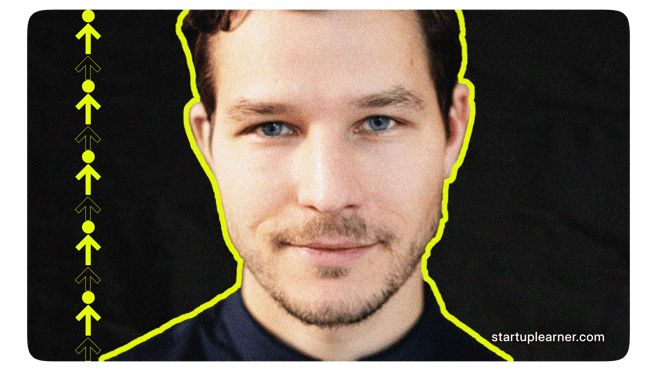Why Founders Should Master Design: Lessons from Raphael Schaad, Creator of Notion Calendar
AIMOST RECENT
Startup Learner
4/7/20254 min read



When Raphael Schaad founded Cron — a next-generation calendar tool later acquired by Notion to become the widely used Notion Calendar — he proved a powerful truth: Great design is not optional. It's essential.
Schaad’s journey from designer to successful founder offers timeless lessons for startup creators. In a world increasingly dominated by AI and rapid iteration, his philosophy reinforces one fundamental idea:
Design is not just how something looks. It’s how it works — and how it's built.
This article dives into Raphael’s process and shares actionable insights on why founders must embrace design deeply from day one.
Why Founders Should Care About Design
Schaad breaks it down into three pillars that every successful product must stand on:
Desirability: People must want the product.
Feasibility: The product must be buildable with available technology.
Viability: It must be sustainable as a business.
Design, according to Raphael, is the discipline that ensures desirability — making sure the product fits the real needs and desires of users. Without strong design thinking early on, startups risk building products that solve problems nobody cares about.
In the age of AI disruption, the bar for user experience is rising fast. Founders who recognize the power of thoughtful, intentional design will have a significant advantage.
Why More Designers Should Become Founders
Historically, design was closer to art — expressing questions rather than solving them. Over time, especially during industrialization, design evolved into a problem-solving discipline, aligned more with engineering and business.
Today, the means of production (software, tools, code) are accessible to designers. They no longer need to hand off their ideas to engineers — they can build directly.
This shift is why Raphael urges more designers to build companies, not just products.
Designers understand desirability naturally.
Access to no-code/low-code tools bridges technical gaps.
The era of "design-led startups" is now, not later.
Raphael Schaad's Journey: Designer, Maker, Founder
Schaad’s background reflects a strong blend of disciplines:
Technical Foundation: A degree in computer science allowed him to build the designs he envisioned.
Creative Excellence: Graduate studies at the MIT Media Lab emphasized physical and digital product creation.
Founder Mindset: His ability to ship, iterate, and learn made Cron a success — eventually acquired by Notion.
Key takeaway:
Founders who can both design and build will dominate the next generation of startups.
Should Designers Learn to Code?
Raphael’s advice is simple:
Be comfortable in the medium you are designing for.
If you are building software, understanding code (even at a high level) dramatically increases your ability to ship real products, not just prototypes.
Especially in an AI-driven world, where dynamic behaviors like "autocomplete" and "agent-based actions" are becoming core features, static mockups break down quickly.
Founders must move beyond "rectangles inside rectangles" thinking and design experiences, not screens.
How Non-Designers Can Develop Better Taste
For technical founders or those without a design background, Raphael recommends three practical steps:
1. Start Designing — Badly
You will not produce great design at first. But doing (even badly) teaches you why some designs work and others don't. You begin to "see the Matrix" — the invisible patterns behind great design.
2. Surround Yourself with Beautiful Products
Only let well-designed tools, apps, and physical products into your life. High-quality design trains your subconscious understanding of beauty, function, and longevity.
3. Read Foundational Design Books
Raphael suggests three timeless classics:
Grid Systems by Josef Müller-Brockmann: Learn about layout and structure.
The Elements of Typographic Style by Robert Bringhurst: Master typography.
The Design of Everyday Things by Don Norman: Understand usability and user mental models.
Building taste is like building muscle — constant exposure and reflection are key.
Everything Is Designed — But Not Everything Is Designed Well
One of the most profound ideas Raphael shares is this:
Everything around you has been designed — intentionally or accidentally.
Realizing this empowers founders. If everything is the result of choices, why not make better, more thoughtful ones for your own products?
Great founders and great designers both recognize that intentionality is the difference between mediocre and exceptional experiences.
Why Now Is the Best Time to Prioritize Design
In an era where AI is rapidly rewriting the rules, design is more important than ever:
AI products require intuitive experiences.
Human-centric design becomes a competitive moat.
Tasteful design stands out in a sea of rushed products.
As Gary Tan (President of YC) recently said:
“Good design, especially in early-stage startups, is becoming a lost art.”
The founders who care about design today will be the ones who win tomorrow.
Raphael's Tactical Design Process for Founders
Here’s how Raphael Schaad approaches building products:
Step 1: Start with Paper
Quick, rough sketches on paper allow for free ideation without technical constraints.
Step 2: Move to High Fidelity Quickly
Instead of endlessly refining mockups, jump into real, interactive prototypes as soon as possible — ideally using live data.
Step 3: Feel the Design
Good design isn't just visual — it feels intuitive. Test real flows to understand how users will emotionally experience interactions.
Step 4: Iterate with Users
User feedback (not personal preference) should ultimately validate whether a design works or needs improvement.
Final Advice for Founders
Raphael’s core message to future builders:
Designers should become founders — the skills are transferable and critical.
Founders must develop design mindsets — it's a competitive advantage, not a luxury.
Intentional design wins — not just beautiful UI, but products that work, delight, and last.
Startups that integrate great design from the beginning — not as an afterthought — will shape the future.
Closing Thought:
In a world where speed, AI, and competition dominate, the founders who build intentional, beautiful, and functional products will lead the way.


